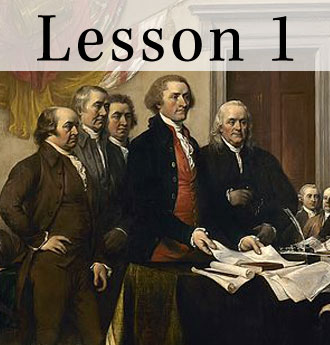Lesson 1: What Did the Founders Think about Constitutional Government?
A Modell of Christian Charity ("City Upon a Hill" sermon)--John Winthrop, 1630
Believed to be written and delivered en route to Massachusetts, Rev. Winthrop warned his Puritan colonists that their new community would be a "city upon a hill," watched by the world.
Link: http://www.ushistory.org/us/3c.asp
Aristotle--Politics, 350 BCE
Aristotle's work on such topics as the political community, economics, property rights, citizenship, leadership, constitutions and the ideal state.
Link: http://classics.mit.edu/Aristotle/politics.html
Cicero--De re publica (The Republic or On The Commonwealth), 54-51BC
Cicero's theories of constitutions, education, and citizenship.
Link: http://is.gd/2EM01
Commentaries on the Laws of England (1765-1769), by William Blackstone
William Blackstone's Commentaries on the Laws of England divides the history of English common law into four categories: rights of persons, rights of things, private wrongs (torts), and public wrongs (crimes). Written to be understood by non-lawyers, this work became an important source of legal information for the American colonists.
Link: http://avalon.law.yale.edu/subject_menus/blackstone.asp
Complete Works, by Montesquieu
Montesquieu (Charles-Louis de Secondat, baron de La Brede et de Montesquieu) was a French nobleman and lawyer, recognized as one of greatest thinkers of Enlightenment. He first gained fame for a satire, the Persian Letters, in 1721, pointing out absurdities of modern European, especially French, life. He also published Considerations of the Causes of the Greatness of the Romans and of their Decline (anonymously) in 1734. His masterpiece, The Spirit of the Laws, published 1748, was placed on the Index of Forbidden Books by Catholic Church because of "liberal" views.
Link: http://oll.libertyfund.org/title/1855
De Officiis (On Moral Duties), by Marcus Tullius Cicero
Cicero's De Officiis is a profound meditation on morality and moral duty, including moral principles as applied to public life. The book has deeply influenced Western civilization since its writing in 44 BC. De Officiis was so influential that when the printing press was invented, it was the second book to be printed after the Bible.
Link: http://oll.libertyfund.org/title/542
Declaration of Independence (1776)
The Declaration of Independence is a proclamation passed by Congress on July 2, 1776, and issued on July 4, announcing the separation of the "United Colonies" from Britain and the formation of a new nation, the United States of America. The document listed reasons for the separation and a philosophical argument in defense of the action.
Link: https://civiced.org/declaration
Montesquieu--The Spirit of Laws, 1748
In this political treatise Montesquieu advocates the idea that political and legal institutions ought to reflect the social and geographical character of each particular community, that governments need not be permanent.
Link: https://goo.gl/N4Lrkj
Pericles' Funeral Oration
Pericles' speech given at the annual public funeral for fallen soldiers, as told in Thucydides' History of the Peloponnesian War, which extols the virtues and accomplishments of Athens.
Link: http://bit.ly/pericles_funeral_oration
Tocqueville--Democracy in America, 1835, 1840
A review of American representational government in the 1830s, focusing on the reasons for success in America versus attempts and failures in other places.
Link: http://books.google.com/books?id=gTX-uSzS2fAC&printsec=title
Treaty of Paris (1783)
The Treaty of Paris is an agreement signed on September 3, 1783, between Great Britain and the United States that ended the Revolutionary War. With the treaty, Great Britain recognized the independence of the United States. Also called the Peace of Paris.
Link: http://www.ohiohistorycentral.org/entry.php?rec=431
United States Constitution
The supreme law of the United States that provides the framework for the government. The Constitution outlines the nation's institutions of government and the most important rights of the people. The document was created in 1787 during the Philadelphia Convention. The government created by the Constitution took effect on March 4, 1789.
Link: http://civiced.org/constitution






